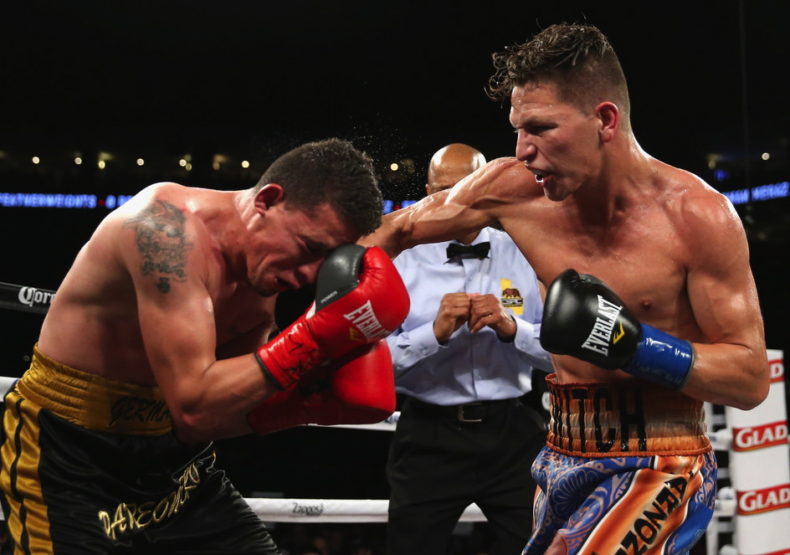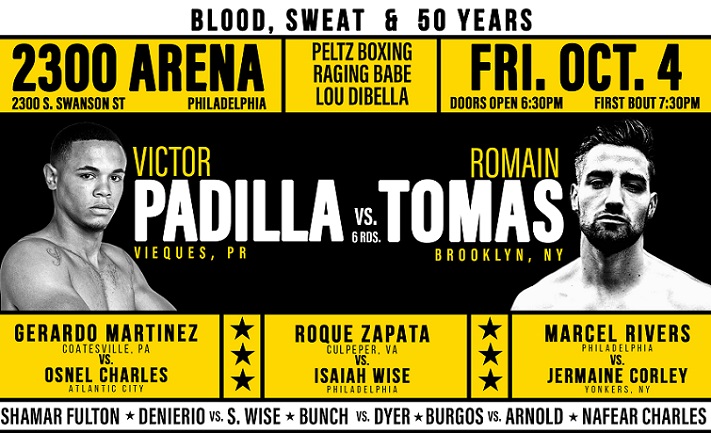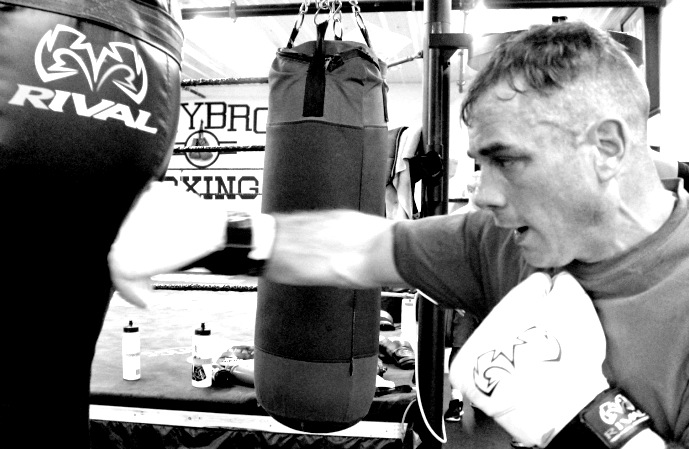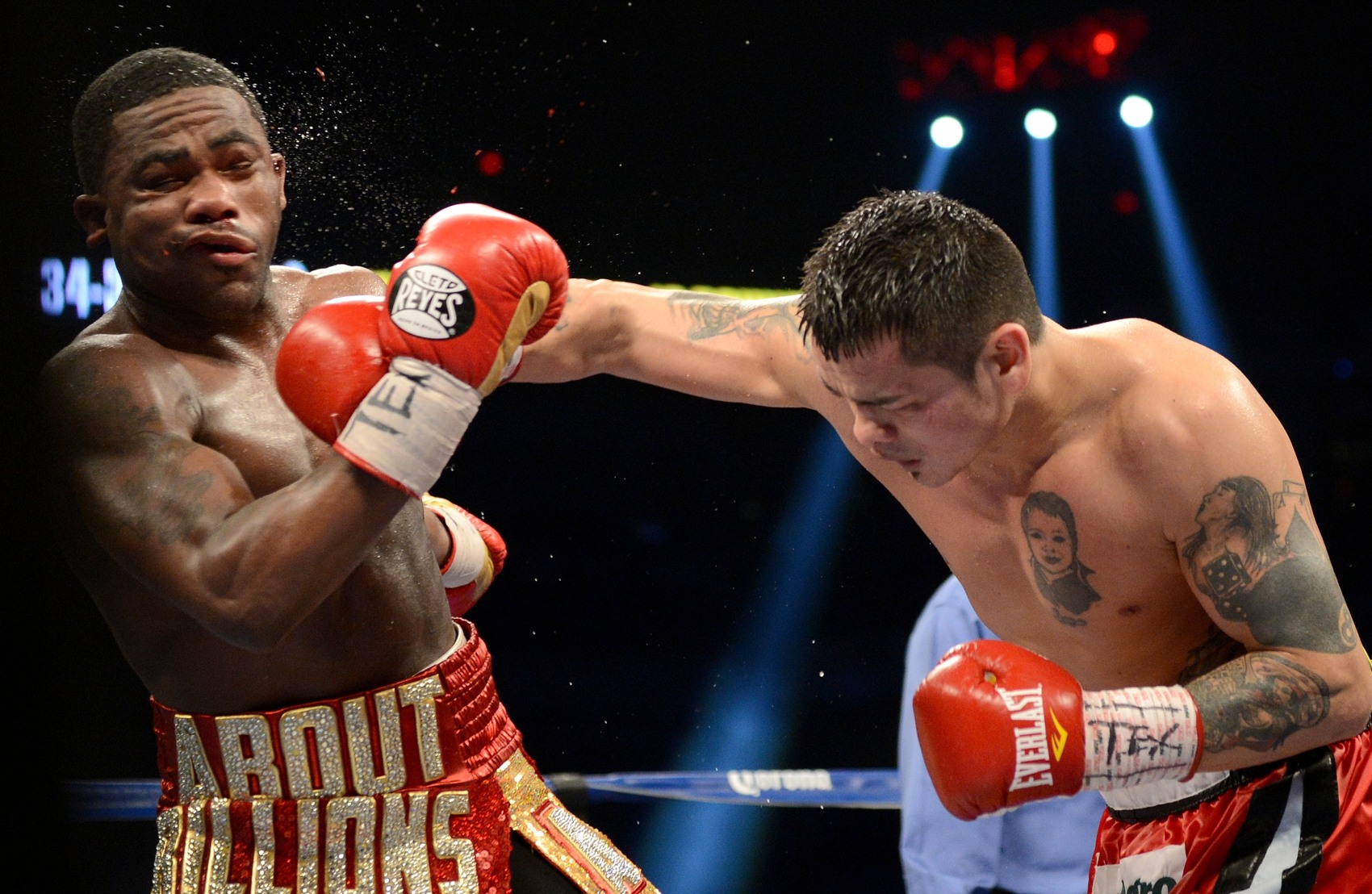Daniel Franco On The Rise
The location of Daniel Franco’s most important fight in a brief but promising professional career came in a venue shrouded in cigar smoke. While this would have been commonplace during boxing’s heyday at arenas where pungent clouds of smoke hung in the air like morning fog, the hazards of fighting under such circumstances cannot be overstated. Luckily for Franco (15-0-3, 10 KOs), the burgeoning contender was able to halt then-undefeated Derrick Murray in four punishing rounds of a scheduled 10.
The win also earned Franco the USBA featherweight title and an IBF ranking that he’s looking to solidify with a breakout 2017 campaign. Winning his first belt as a pro also came as somewhat of a relief to Franco, who expressed his frustration at how the early part of 2016 unfolded. Bludgeoning Murray in such emphatic fashion struck Franco as a sign that he had hit his stride and set himself up for major challenges as a new phase of his career beckoned. But even though Franco couldn’t have asked for a better result in his last contest, he assessed his performance with a critical eye and views refining his mental approach and composure as key to future success.
“Just not letting the crowd get to me,” Franco says when asked about what he sees as something to work on following the Murray fight. “It was a fun event – the whole vibe of the entire event. But when we went out there, the whole crowd was filled with cigar smoke, and it was terrible on my lungs. Luckily I only had to be there for four rounds. I just needed to calm down a little bit more. I was listening to my corner, but I was too excited and that showed in my boxing.”
Daniel Franco, started boxing when he was eight after his poor eyesight rendered baseball a maddening pursuit. One day Franco stumbled into a boxing gym with his two older brothers after skipping baseball practice. He immediately fell in love with the sport, but the extent to which his family would get involved in boxing, and later Franco’s pro career, was something he couldn’t have remotely fathomed at the time. Rather, there was something elemental about boxing that hooked him.
“One thing that stuck out to me was that everybody was on their own,” Franco says. “You didn’t have a team to rely on. I saw the singularity of the sport and I fell in love with it.”
Despite the rush of single combat and the profound responsibility that comes with its implied risks, boxing is very much a family business for Daniel Franco. He describes both his father, Al, and older brother, Michael, who compiled a 19-1 record as a pro before stepping away from active competition in 2011, as his heroes. Both Al and Michael work Daniel’s corner, and the entire Franco clan was nurtured in the sweet science at the gym Al bought called Warzone Boxing Club. The fact that Warzone even exists, according to Daniel, is a testament to the profundity of his father’s support of his career and the family brand they’ve built.
Daniel readily admits to being demonstrative and affectionate with his father — and indeed with his entire family. As for Michael, the “Lil Warrior” may have been the antithesis to Daniel in terms of fighting style, but he remains an integral tactical voice in the corner. It’s this kind of support that enabled the affable and intelligent Daniel to postpone his college studies to pursue boxing full-time. Early in his career, which included a trio of draws and some close calls, Daniel was juggling a stacked course load, working as boxing instructor, and training for his own professional bouts — a punishing schedule that spread him dangerously thin.
Streamlining and sacrifice became more central to Daniel Franco’s outlook and life philosophy, and the young contender admits that he had compelling examples in his own family to follow when it came to fully dedicating himself to his craft. The confidence to embrace his potential as a boxer, and by extension the myriad unknowns that come with trying to make it as a prizefighter, connects back to his father and the role Al plays as both a trainer and parent. “Everything that I see my father sacrifice and every sacrifice that my family has made – whether it be financially or things like skipping family events – I see the sacrifices they’ve made for me. It’s a weird thing to separate your dad and trainer. I don’t really separate it.”
Boxing, of course, is famous for volatile father-son relationships, but the Francos appear to have struck an enviable balance by refusing to compartmentalize the parent-child relationship from the trainer-fighter dynamic. By embracing this interconnected duality, everything appears harmonious. It also helps that Warzone Boxing Club, and Daniel Franco’s upbringing in the sweet science, gave him intense early exposure to elite gym culture.
“When I was an amateur and first learning, I always had professionals around me,” Franco says. “I always had older fighters – people who were champions — around me. I learned everything I could from them when I was young. I saw how resilient they were, and I saw how much hard work they put in. And I doubled what they did. I just wanted to do more and more and more because I wanted to be better than everyone in that gym.”
Perhaps boxing as a family business works for the Francos partly due to Daniel’s ability to self-motivate, a characteristic that he’ll need in abundance over the next calendar year. As Franco gets set to face his sternest test to date in Christopher Martin, he’s officially transitioning into the contender stage of his career. Martin is durable and has a tight defense, and he’s a crafty veteran who has faced superior competition, including Gary Russell Jr. and Jhonny Gonzalez. For Daniel, the chance to score a crucial victory and measure himself against someone like Russell versus a common foe is appealing and essential. “I feel my skills and power are going to be recognized,” Franco says.
The Martin fight will take place in the Franco home base of Southern California, and Daniel relishes fighting in front of a partizan crowd for the first time in over two years. He’s able to effectively deal with the pressure inherent in this after his singing with Roc Nation Sports — whose “broad grasp” and reach appealed to him — allowed him to fight on three Andre Ward undercards in Oakland. While Franco marvelled at the scale of the event the first time he appeared on the same bill as S.O.G., he quickly adopted a more businesslike approach, which has extended to his training regimen and overall countenance.
As an amateur, Daniel Franco earned his “Twitch” moniker because of a technique he used to correct a problematic habit of squaring up. Franco would bob his chin downward to tap his lead shoulder to ensure it was properly positioned, which he did to such an extent that those watching literally thought he had a natural, reflexive twitch. It’s an anecdote that Daniel, far removed from a more innocent time in his career, can look back on and chuckle at. Should he continue his rise up the featherweight ranks, the origin story of “Twitch” may become part of Franco family lore.
— Zachary Alapi





